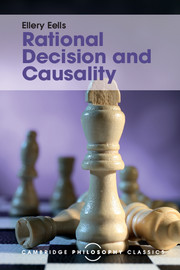Crossref Citations
This Book has been
cited by the following publications. This list is generated based on data provided by Crossref.
Brams, Steven J.
1983.
Superior Beings.
p.
41.
Eells, Ellery
and
Sober, Elliott
1983.
Probabilistic Causality and the Question of Transitivity.
Philosophy of Science,
Vol. 50,
Issue. 1,
p.
35.
Aspinall, P.
and
Hill, A. R.
1983.
CLINICAL INFERENCES AND DECISIONS—I. DIAGNOSIS AND BAYES‘ THEOREM.
Ophthalmic and Physiological Optics,
Vol. 3,
Issue. 3,
p.
295.
Eells, Ellery
1983.
Objective probability theory theory.
Synthese,
Vol. 57,
Issue. 3,
p.
387.
Eells, Eller
1984.
Causal Decision Theory.
PSA: Proceedings of the Biennial Meeting of the Philosophy of Science Association,
Vol. 1984,
Issue. 2,
p.
176.
Seidenfeld, Tedd
1984.
Comments on Causal Decision Theory.
PSA: Proceedings of the Biennial Meeting of the Philosophy of Science Association,
Vol. 1984,
Issue. 2,
p.
201.
Eells, Ellery
1984.
Metatickles and the dynamics of deliberation.
Theory and Decision,
Vol. 17,
Issue. 1,
p.
71.
Harper, Willia
1984.
Ratifiability and Causal Decision Theory: Comments on Eells and Seidenfeld.
PSA: Proceedings of the Biennial Meeting of the Philosophy of Science Association,
Vol. 1984,
Issue. 2,
p.
213.
Sasieni, Maurice W.
1984.
Newcomb's paradox.
Theory and Decision,
Vol. 16,
Issue. 3,
p.
217.
Eells, Ellery
1984.
Newcomb's many solutions.
Theory and Decision,
Vol. 16,
Issue. 1,
p.
59.
Rabinowicz, Wlodzimierz
1985.
Ratificationism without ratification: Jeffrey meets Savage.
Theory and Decision,
Vol. 19,
Issue. 2,
p.
171.
Snow, Paul
1985.
The value of information in Newcomb's Problem and the Prisoners' Dilemma.
Theory and Decision,
Vol. 18,
Issue. 2,
p.
129.
Riley, Jonathan
1985.
On the Possibility of Liberal Democracy.
American Political Science Review,
Vol. 79,
Issue. 4,
p.
1135.
Horwich, Paul
1985.
Decision Theory in Light of Newcomb's Problem.
Philosophy of Science,
Vol. 52,
Issue. 3,
p.
431.
Falk, Arthur E.
1985.
Ifs and Newcombs.
Canadian Journal of Philosophy,
Vol. 15,
Issue. 3,
p.
449.
Armendt, Brad
1986.
A foundation for causal decision theory.
Topoi,
Vol. 5,
Issue. 1,
p.
3.
Skyrms, Brian
1986.
Deliberational equilibria.
Topoi,
Vol. 5,
Issue. 1,
p.
59.
Price, Huw
1986.
Against causal decision theory.
Synthese,
Vol. 67,
Issue. 2,
p.
195.
Eells, Ellery
and
Sober, Elliott
1986.
Common Causes and Decision Theory.
Philosophy of Science,
Vol. 53,
Issue. 2,
p.
223.
Talbott, W. J.
1987.
Standard and non-standard Newcomb Problems.
Synthese,
Vol. 70,
Issue. 3,
p.
415.



